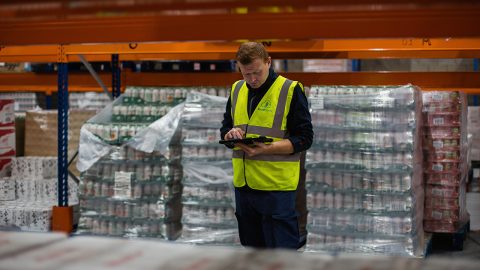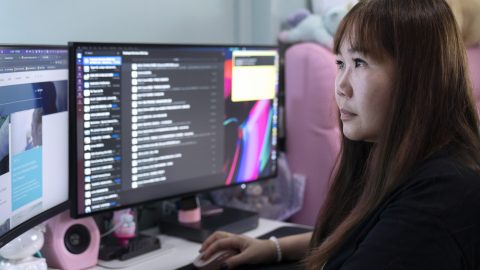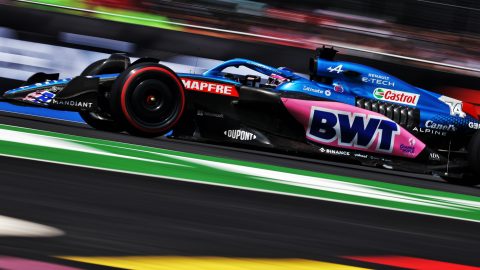A sustainable water supply and smart manufacturing fuel an ongoing partnership between Ecolab and Microsoft
In cities around the world that have experienced far more rain than sunshine this year, like Seattle and Alicante, Spain, it’s easy to take water for granted. But worldwide, water is a finite resource. In India, a multi-year drought has affected more than 300 million people. Fresh water – the kind that comes from glaciers, ice caps, groundwater, lakes, rivers, ice and snow – makes up only 2.5 percent of the entire planet’s supply.
Water is vital to life, not just because we need it every day to survive, but because we also use it to produce almost everything we touch on a daily basis: food, clothes, transportation and housing. The coffee you drank this morning took 55 gallons of water to produce, the shirt you’re wearing took another 700 gallons and the car you drive to work required a staggering 39,090 gallons to build.
 The demand for water has risen alongside population growth, urbanization, changing diets, rising demand for energy and increasing industrialization, and the amount of water needed for manufacturing is expected to rise 400 percent through 2050. The United Nations’ “World Water Development Report 2015” predicts that in less than 15 years, demand for water will outpace supply by almost 40 percent. That lack of freshwater will be a major source of stress for two-thirds of the world’s population.
The demand for water has risen alongside population growth, urbanization, changing diets, rising demand for energy and increasing industrialization, and the amount of water needed for manufacturing is expected to rise 400 percent through 2050. The United Nations’ “World Water Development Report 2015” predicts that in less than 15 years, demand for water will outpace supply by almost 40 percent. That lack of freshwater will be a major source of stress for two-thirds of the world’s population.
Increasingly, businesses are realizing they need better solutions, both to minimize water consumption for their own operations and to be better stewards of this precious resource for people around the globe, many of whom don’t have easy access to fresh, clean water.
“We are focused on nothing less than changing the world with technology,” says Toni Townes-Whitley, corporate vice president of Microsoft Worldwide Public Sector and Industry. “We fully believe that digital transformation can enable achieving the U.N. Sustainable Development Goals and create more social and economic impact so that every person benefits.”
Ecolab, a leading global provider of water, hygiene and energy technologies and services, believes it can help address the looming water shortage in part through an ongoing partnership with Microsoft. The $13 billion company is using developments in cloud computing, powerful analytics, and principles of smart manufacturing and sustainability, to help industries around the world tackle water scarcity.
Smart manufacturing, which relies on automated and self-maintained processes, helps lower production costs and improve quality, while minimizing environmental impact, the use of natural resources and energy consumption. The introduction of these smart processes could save the manufacturing industry $349 billion, according to the Global e-Sustainability Initiative.
Data, too, can play an important role in transforming the way businesses use water to create a more sustainable future. Companies need to assess water-related business risks in order to understand the gap between what they pay for water and the potential costs of inefficient water usage to their business. That’s why Ecolab, in partnership with Trucost and Microsoft, recently launched an enhanced Water Risk Monetizer, just in time for World Water Day.
“Water is the lifeblood of manufacturing. Diminishing availability of water and declining water quality around the world is increasingly a constraint to growth for manufacturers,” says Emilio Tenuta, vice president of Corporate Sustainability at Ecolab. “Because water is underpriced in most regions of the world, it’s often challenging for companies to make the business case for investment in water conservation and reuse projects. The Water Risk Monetizer provides a way for companies to incorporate water risks into their decision making to support smarter, more efficient manufacturing practices.”
The Water Risk Monetizer, built on the Azure Cloud, is the first no-cost, publicly available water risk analysis and financial modeling tool that translates water scarcity risks into financial terms, and gives businesses more data to factor current and future water risks into their decisions.
“The Water Risk Monetizer quantifies the full value of incoming and outgoing water to a specific location based on basin-level quantity and quality considerations – taking into account tangible factors such as scarcity and impairments as well as less tangible human health and environment impacts of water use,” Tenuta says. “It’s all about informing decisions to take action today to mitigate current and future risks.”
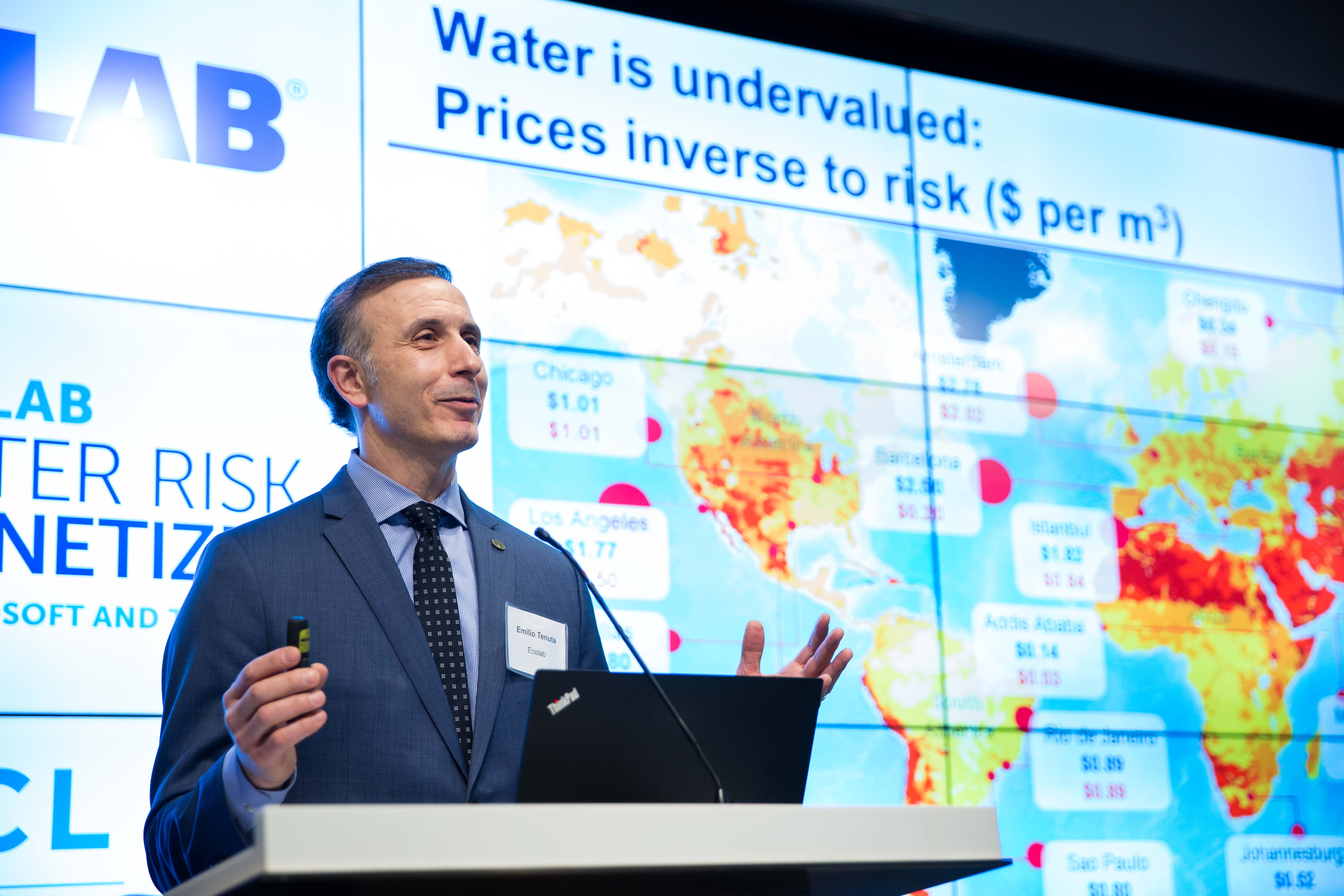
Companies that use the tool will be able to predict trends and prevent problems related to water availability and quality before they arise – a huge help in mitigating potential business risks and lessening their environmental impact.
This tool supports Ecolab’s mission to leverage data and insights to help companies improve production processes and prove that water-saving solutions make sound business sense.
Microsoft is already using the enhanced Water Risk Monetizer to prioritize locations and optimize its water management projects, like the datacenter near San Antonio, Texas, located within the Leon Creek Watershed, which is considered a high water-stress region.
“The data insights we gained through the Water Risk Monetizer tool were impressive,” writes Josh Henretig, who is responsible for helping define and implement global environmental strategy for Microsoft. “The Water Risk Monetizer output showed that the risk adjusted water bill, representing the full value of water to Microsoft’s operations, is more than 11 times greater than the current water bill presented by the San Antonio Water System.”
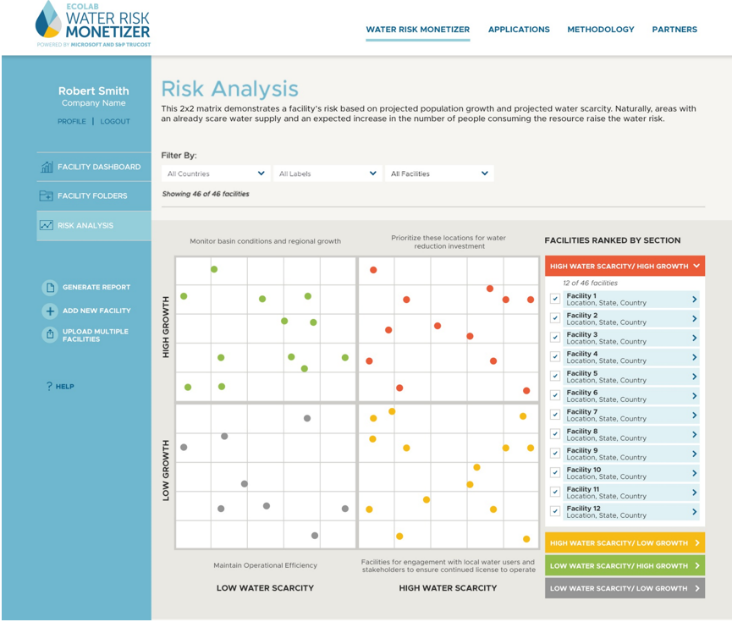 With that data, Microsoft worked with Nalco Water, an Ecolab company, to develop a strategy where they now use recycled water and Nalco Water technology to save more than $140,000 in water costs per year and avoid the use of 58.3 million gallons of potable water per year.
With that data, Microsoft worked with Nalco Water, an Ecolab company, to develop a strategy where they now use recycled water and Nalco Water technology to save more than $140,000 in water costs per year and avoid the use of 58.3 million gallons of potable water per year.
With the demand for water management services growing, Nalco Water is creating ways to monitor and control industrial processes on a global scale.
The ongoing collaboration with Microsoft brings in the Azure cloud computing platform and advanced analytical capabilities that deliver Nalco Water’s water management solutions on a much larger scale and at a much deeper level than it ever has.
Digital strategy consulting company Accenture estimates that smart manufacturing solutions have the potential to create energy savings of 4.2 billion megawatt hours (Mwh) and save 81 billion liters of water through more efficient production processes.
Ecolab has a vision to help companies engaged in industries such as energy, agriculture, food and beverage, manufacturing and hospitality achieve net-zero water usage, meaning producing goods with the absolute minimum amount of freshwater. Or in other words, all of the water they use can be infinitely recycled within their operation. To get to that goal, the company applies and reinforces principles of reducing, reusing and recycling water to customers’ operations across industries all around the world.
Nalco Water’s 3D TRASAR™ Technology, which provides real-time sensing and dosing of streams for cooling towers and other water-intensive processes, delivers in-plant measurement and control for industrial and commercial operations worldwide. Thousands of sensors in thousands of facilities around the world feed data to in-plant monitoring equipment, and that data is then transferred in real-time to a secure cloud storage platform built on Microsoft Azure and Azure IoT Suite.
There’s another advantage to collecting so much data on a single data platform with the analytical power of the cloud: it helps establish operational benchmarks, by comparing millions of data points from common processes across thousands of plants and customers. With this information, Ecolab will be able to identify more ways to help its customers operate more effectively and efficiently.
“Suddenly, complexity and size are no longer barriers,” says Christophe Beck, Ecolab executive vice president and president, Nalco Water. “We can capture any data, anywhere, and transmit that information around the world very rapidly.”
Top photo by Justin Iadd.


